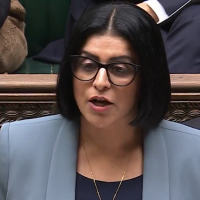
“Try praying” suggests the bus as it pulls up. Ironic, really, given how much of my life I’ve spent in this draughty shelter, earnestly praying that a late bus would just turn up. Well, here is a bus, but it is not the one I’m waiting for. However, its slogan has lodged in my mind. Perhaps I should pray anyway, just to pass the time? What would I pray for right now, beyond the bus I want? Are any of my other prayer requests something that God is likely to countenance? I’m all too well aware that there are some things on my personal wish-list that the Almighty is definitely not going to grant.
In 2022 a Church of England survey found that nearly half the population (48 per cent) claims to pray, and the numbers are apparently even higher among the 18-24 age bracket. In the breakdown of the statistics, it can be seen that the poll respondents prayed for all the ‘right’ things – for peace, forgiveness, guidance, and for those in need. So far, so pious. Would any of us really admit to a pollster that we pray for the other, slightly more selfish things – a convenient parking space, good weather on a holiday? Such prayers are suitably benign, but probably also pointless. God, surely, has better things to do. We still pray them though. Well, I do anyway. Maybe you are better than me, but I’ll go ahead and admit to all those little, probably pointless prayers – prayers revealing that inwardly I’m quite selfish, and a bit of a narcissist, a girl who just wants an easy life and an on-time bus.
Perhaps the uncomfortable truth here is that a lot of prayer is born out of a desire for ease and comfort. Prayers for peace, forgiveness, guidance, and even prayers for others in need can be no less a response to a sense of discomfort or discontent than the prayers to get me out of this draughty bus shelter. But such desires are entirely natural. After all, as humans we are programmed to maintain homeostasis. Within that, most functions can happen internally – so when the individual body is too hot, it sweats; when the body is too cold, it shivers (like me in this shelter right now). It’s all about control.
But sometimes the discomforts are emotional, and we are dependent on external factors to maintain or regain our homeostatic sense of peace – factors that are out of our (or any person’s) control. To pray is to make a cognitive response to that realisation, to seek some input from a higher power. There is nothing I can do to make the bus come on time, and in the absence of peace, forgiveness, guidance, or when contemplating the multifarious sicknesses and struggles of my fellow human beings – well, I realise that maybe damn near everything is out of my control. God, can you do something about this? It’s making me uncomfortable.
Oddly enough, even the most well-known of Christian prayers, the so-called “Lord’s Prayer” (Our Father, who art in Heaven… etc. etc.) makes no bones about acknowledging this. Part way through, like hungry children who loiter in the kitchen whilst mother is cooking dinner, unashamed the pray-ers cry out: “Give us this day our daily bread.” It is a daily moment of divinely sanctioned gimme, gimme, gimme. My selfish inner narcissist loves that bit.
I’m not generally praying for bread; I have bread. But to me the bread is a metaphor for all my inner needs and appetites. I think one of the early Christian writers, Augustine of Hippo, grasped this uncomfortable truth also. Reflecting on the brutal honesty of the prayers which are found in the Bible’s Book of Psalms, he wrote: “Your desire is your prayer, your prayer is your desire.” Augustine was not advocating that such desires should be uncritically indulged, but that pray-ers should be honest enough to verbalise their desires, to acknowledge them before God, and in that way allow sunshine to become the best disinfectant.
There is, perhaps, no bleaker statement than the words, “I haven’t got a prayer.” Where there is prayer, there is imagination, and imagination is a sign of hope.
How interesting that the Lord’s Prayer acknowledges this basic human need – this need to say, “God, life is uncomfortable, and I don’t like this feeling.” I wonder about the other 52 per cent of the poll respondents, the ones who said that they didn’t pray. What on earth do they do with their appetites, with their difficulties, or with their sense of malaise? Because I think Augustine was right: prayer is all about desire, and desire is about hope for satiety – be it physical, emotional, or cognitive. Prayer is anticipating that our desires can or might be met by someone or something, out there somewhere, and allowing ourselves to imagine how that might come to be. There is, perhaps, no bleaker statement than the words, “I haven’t got a prayer.” Where there is prayer, there is imagination, and imagination is a sign of hope.
It takes a bit of courage, sometimes, to admit to what we imagine, what we secretly hope for. It might be a world of peace and prosperity for all, but it might also be for the demise of an enemy or for a successful and stress-free life. Psychologists Ann and Barry Ulanov observe that in this way, all prayer is confession, even the prayers where we are asking for stuff. By coming face-to-face with God, we also have to come face-to-face with ourselves, including our selfishness and narcissistic longing.
So, have I got the courage to verbalise my personal wish-list? To take this idle moment and allow my imagination to present God with all my deepest, darkest desires? Well, it sounds like it might be good for me, whether God is listening or not. Prayer, it seems, is an opportunity for some gritty self-reflection and deep personal growth. So why not? Here goes:
“Dear Heavenly Father…
…Oh, never mind, my bus is here.
Amen.”








